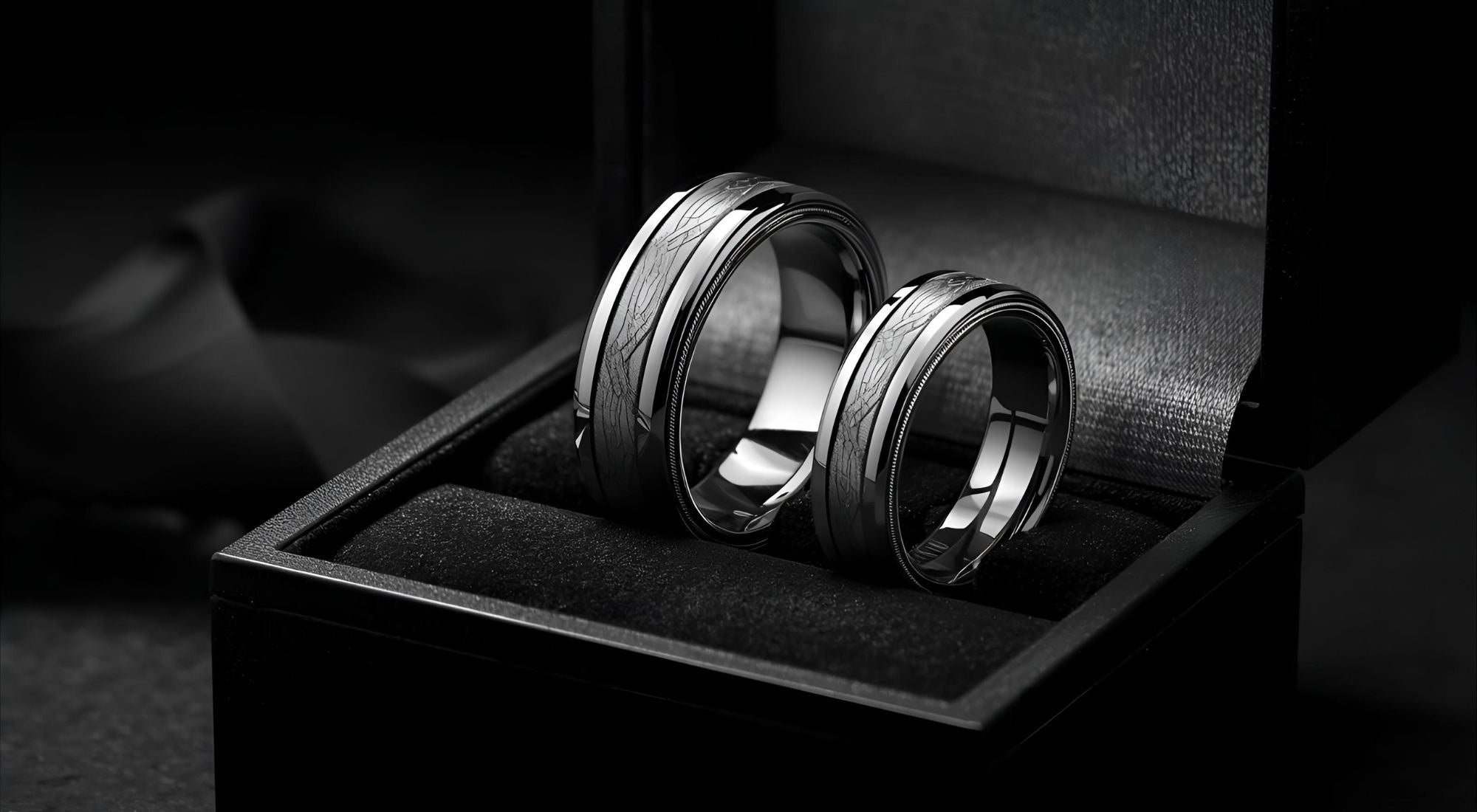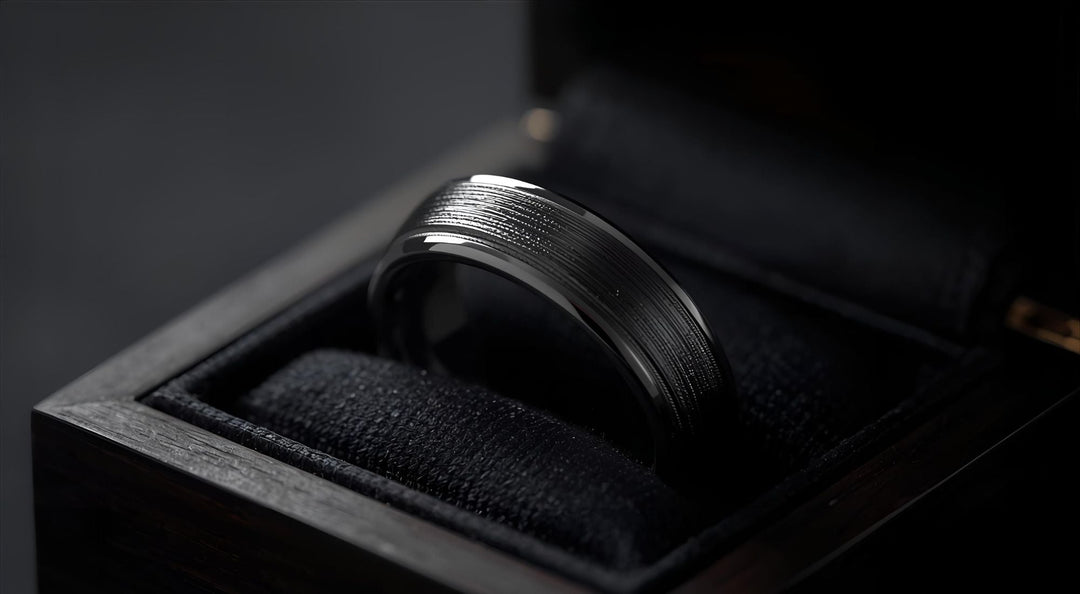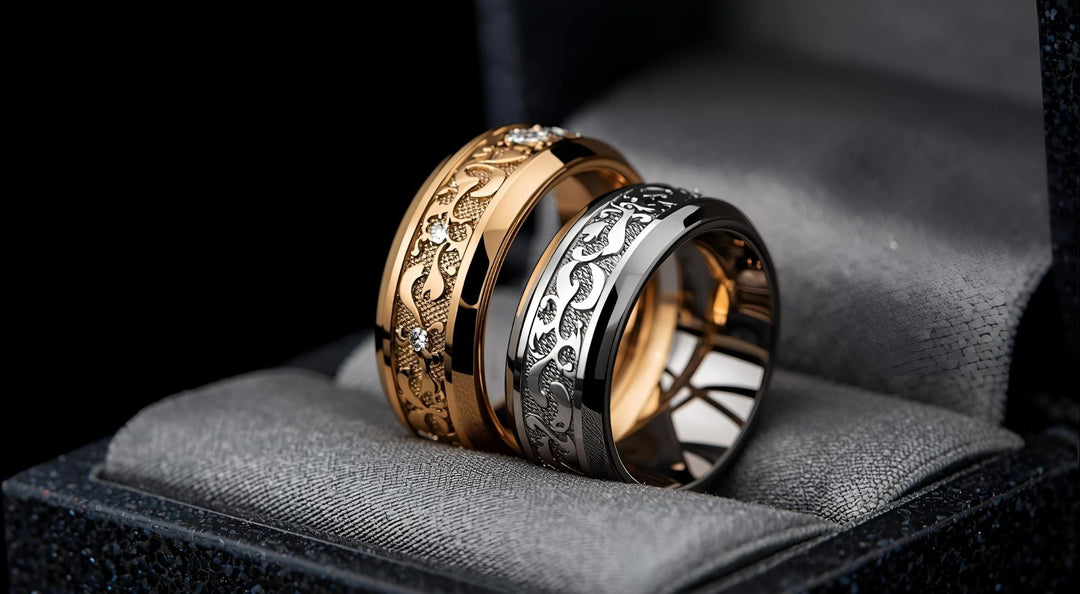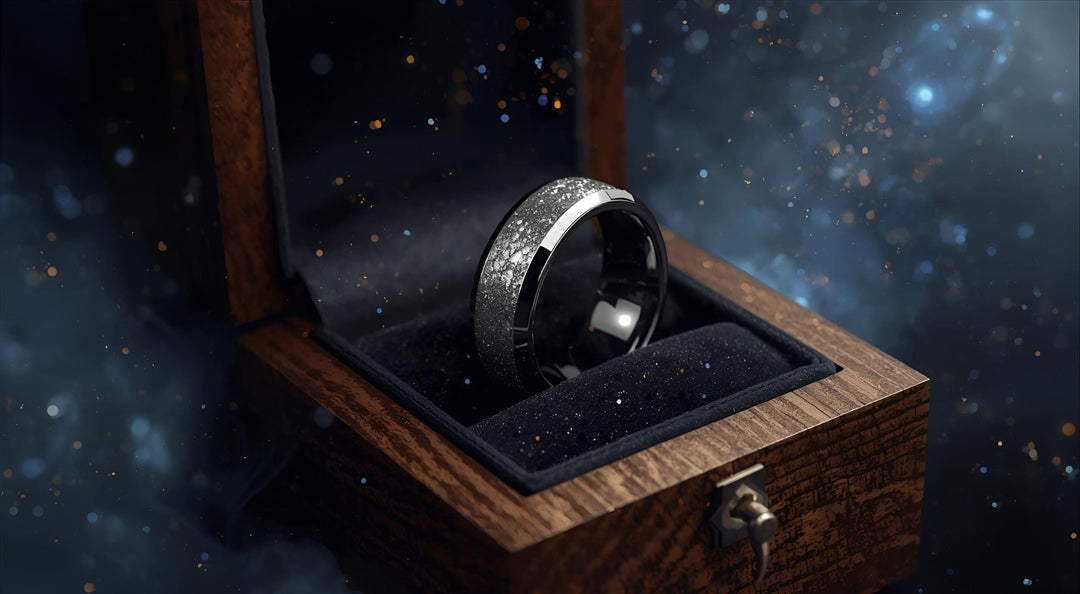Yes, tungsten rings can shatter, but understanding why and when this happens helps put their durability into perspective. Tungsten carbide, the material used in most tungsten rings, is exceptionally hard—much harder than gold, silver, or even titanium. This hardness makes tungsten highly scratch-resistant and able to maintain a polished, like-new appearance for years. However, this same hardness comes with a trade-off: brittleness. Unlike softer metals that bend or dent under pressure, tungsten does not flex. When subjected to extreme force—such as being dropped on a hard surface, struck with a hammer, or crushed under heavy weight—a tungsten ring can crack or even break.
Despite this potential for shattering, tungsten rings remain one of the most durable options for everyday wear. For most daily activities, including sports, manual work, and general lifestyle wear, these rings hold up exceptionally well. Understanding their limits allows wearers to enjoy their sleek, modern design with confidence, while taking simple precautions during heavy-duty tasks. In short, while tungsten rings can shatter under extreme conditions, their strength and scratch resistance make them a reliable and long-lasting choice for both fashion and functional jewelry.
💍 Looking for durable and stylish rings?
Explore our full Tungsten Rings Collection and check out our Best Sellers to find the most popular designs crafted for strength, elegance, and lasting appeal.
So, Do Tungsten Rings Really Shatter?
Yes, tungsten rings can shatter, but only under specific circumstances:
- If dropped from a significant height onto a hard surface (like concrete or tile)
- If struck with sharp force (like being hit with a hammer)
- If exposed to extreme pressure or sudden impact
This is because tungsten carbide, while very hard, is also brittle — meaning it doesn’t bend or deform like softer metals. Instead, it can crack or break. Think of it like a ceramic tile: tough, but not flexible.
Why This Isn’t a Daily Concern
Although tungsten rings have the potential to shatter under extreme conditions, this is rarely an issue during everyday wear. Tungsten carbide is exceptionally hard and scratch-resistant, allowing these rings to withstand daily activities with ease. Simple knocks, bumps, or even vigorous workouts won’t compromise their integrity, and routine actions such as washing your hands, cooking, or exercising pose no risk.
Most instances of breakage occur only under unusual circumstances—such as dropping the ring onto a hard surface from a significant height or striking it with intentional force. In practical terms, these scenarios are uncommon for everyday life. For the vast majority of wearers, a tungsten ring remains a safe, durable, and reliable accessory that combines modern style with long-lasting strength.
In short, unless you deliberately attempt to crush it, your tungsten ring is engineered to endure normal wear and tear without issue, making it a worry-free choice for both functionality and fashion.
Shattering in Emergencies: A Hidden Safety Feature?
Interestingly, the very brittleness that makes tungsten rings prone to shattering can also serve as an unexpected safety advantage in certain emergencies. Unlike traditional metals such as gold, silver, or titanium—which often require specialized tools like ring cutters or saws for removal—tungsten rings can be broken quickly and safely using basic tools such as vice grips. This capability allows emergency personnel to remove a ring efficiently if a finger becomes swollen, trapped, or injured, reducing the risk of further damage or circulation problems.
Far from being a drawback, this feature makes tungsten rings particularly practical for individuals in high-risk professions, athletes, or anyone concerned about potential trauma to the hands. Firefighters, paramedics, and other emergency responders often appreciate this property, as it enables rapid intervention without compromising the safety of the patient. In this context, a tungsten ring’s tendency to shatter is not a flaw but a protective attribute, combining durability in everyday life with an added layer of safety when the unexpected occurs.
Can a Shattered Tungsten Ring Be Repaired?

Unfortunately, no—once a tungsten ring breaks, it cannot be soldered, reshaped, or repaired like traditional metals such as gold or silver. Its exceptional hardness, while a major advantage in daily wear, also makes it impossible to fix once fractured.
The Good News
Fortunately, most reputable brands, including RealTungsten, offer a lifetime replacement warranty. This means that if your tungsten ring ever shatters, you can receive a brand-new replacement without hassle, ensuring peace of mind alongside durability.
Pros and Cons of Tungsten’s Brittleness
Pros:
- Acts as a built-in safety feature in emergencies
- Retains its shape and polish permanently
- Extremely resistant to bending or warping
Cons:
- Can shatter under strong impact
- Not resizable or repairable
How to Prevent Your Tungsten Ring From Breaking
- Avoid dropping it on hard surfaces such as tile, marble, or concrete.
- Remove it during heavy manual labor or high-impact activities.
- Store it in a padded box or soft cloth when not in use.
With simple care and mindful handling, the vast majority of tungsten ring owners never experience shattering. This makes tungsten a highly reliable choice for anyone seeking a stylish, durable, and low-maintenance ring that combines modern design with long-lasting strength.
How Likely Is a Tungsten Ring to Break?
 Tungsten rings are extremely hard — but that also makes them more brittle than other metals. While it’s unlikely to break under normal wear, a tungsten ring can crack or shatter if exposed to a sharp impact or dropped on a hard surface, like concrete or tile.
Tungsten rings are extremely hard — but that also makes them more brittle than other metals. While it’s unlikely to break under normal wear, a tungsten ring can crack or shatter if exposed to a sharp impact or dropped on a hard surface, like concrete or tile.
This happens because tungsten has very high hardness (8.5–9 on the Mohs scale), but low ductility — meaning it doesn’t bend or flex under pressure. Instead of warping like gold or titanium, it may snap if the force is strong enough.
✅ When Might a Tungsten Ring Break?
- If it’s dropped from a significant height onto a hard floor
- If it's caught in machinery or crushed in an accident
- If it’s hit with a hammer or sharp, concentrated force
⚠️ Should You Be Worried?
Not really. Under normal daily use — like wearing it at work, in the gym, or during chores — your tungsten ring is very unlikely to break. It’s much more resistant to scratches and dents than gold, silver, or titanium. Just avoid slamming it against hard surfaces.
💡 Pro tip: Some jewelers offer lifetime replacement warranties for breakage — it’s worth checking before you buy.
Why Does My Tungsten Ring Keep Breaking?

If your tungsten ring keeps breaking, it's likely due to the brittle nature of tungsten carbide, the material most tungsten rings are made from. While tungsten is extremely hard and scratch-resistant, it lacks flexibility — so under certain conditions, it can crack or shatter, especially if exposed to impact or stress.
🔍 Top Reasons Tungsten Rings Break Repeatedly:
1. Accidental Drops or Hard Impacts
Tungsten rings can break when dropped on hard surfaces like tile, concrete, or stone. Even a short fall at the wrong angle can cause a fracture.
2. Low-Quality Manufacturing
Not all tungsten rings are created equal. Cheaper rings may use inferior tungsten carbide blends, which are more brittle or poorly constructed. Rings without a proper binder like nickel (instead of cobalt) may also be more prone to breaking.
3. Excessive Force or Compression
Tungsten doesn’t bend — so if the ring is compressed or crushed, it can snap. This might happen if it's pinched between objects or during heavy manual work.
4. Improper Fit
If a ring is too tight, it may be under constant tension, increasing the risk of breakage. Similarly, rings that are too loose may be more likely to fall off and hit the ground.
✅ How to Prevent It From Happening Again
- Buy from a reputable jeweler using high-quality tungsten carbide with a nickel binder.
- Avoid dropping your ring on hard surfaces.
- Remove your ring during intense physical activities or when working with tools.
- Make sure the ring fits properly — not too tight or loose.
- Look for rings with lifetime warranties or breakage guarantees.
⚠️ Important: Tungsten breaking is actually a safety feature in some cases — the ring will crack under extreme pressure instead of crushing your finger, which is why it's still considered a safe metal to wear.
What Is the Lifespan of a Tungsten Ring?
 A tungsten ring can last a lifetime — or even longer. Thanks to its extreme hardness and resistance to scratching, tarnishing, and corrosion, tungsten carbide is one of the most durable materials used in jewelry today. It maintains its shine and structure far better than traditional metals like gold or silver.
A tungsten ring can last a lifetime — or even longer. Thanks to its extreme hardness and resistance to scratching, tarnishing, and corrosion, tungsten carbide is one of the most durable materials used in jewelry today. It maintains its shine and structure far better than traditional metals like gold or silver.
💍 Wondering how tungsten performs over time?
Learn whether adjustments are possible in Can a Tungsten Ring Be Resized? and discover the true longevity of this metal in How Long Will a Tungsten Ring Last? — helping you make a confident and informed decision.
✅ Why Tungsten Rings Last So Long:
1. Scratch Resistance
Tungsten ranks 8.5–9 on the Mohs hardness scale, second only to diamonds. That means everyday activities — even ones that would scratch gold or titanium — won’t affect a tungsten ring.
2. Tarnish- and Rust-Proof
Tungsten doesn’t oxidize, tarnish, or rust, even with exposure to water, sweat, or air. That makes it perfect for daily wear, including in humid or harsh environments.
3. Minimal Maintenance
Unlike silver or white gold, tungsten doesn’t need polishing or replating. It keeps its original shine with little effort.
⚠️ But Can It Break Over Time?
Tungsten is not indestructible. While it won’t wear down or bend, it can crack or shatter under extreme force or sharp impact, due to its brittleness. That said, under normal wear, this is rare.
💡 Bonus Tip: Choose a ring with a lifetime warranty for added peace of mind — many reputable jewelers offer free replacements if breakage ever happens.
🔄 In Summary:
- Lifespan: Decades or a lifetime with proper care
- Main Strength: Keeps its appearance without fading or scratching
- Care Level: Extremely low-maintenance
- Risk: Can break if dropped or hit with high force
✅ Bottom line: Tungsten rings are built to last a lifetime — making them a smart, stylish, and durable choice for wedding bands or everyday jewelry.
FAQs – Do Tungsten Rings Shatter?
1. Do Tungsten Rings Really Shatter?
Yes, tungsten rings can shatter under extreme pressure. Unlike gold or silver, which bend, tungsten carbide is a very hard but brittle metal. This means it doesn’t deform—it either stays intact or breaks. This property makes tungsten unique among modern wedding band materials.
2. Why Do Tungsten Rings Shatter Instead of Bend?
Tungsten carbide has an extremely high hardness rating, second only to diamonds. This hardness gives tungsten rings scratch resistance but also makes them less flexible. When exposed to sudden impact, the ring doesn’t bend—it can fracture or break into pieces.
3. Is Shattering a Tungsten Ring Common in Everyday Life?
No, it’s very rare. Tungsten rings are strong enough to handle everyday wear like typing, cooking, or working out. They typically only shatter if dropped on a very hard surface or hit with extreme force, such as a hammer strike or heavy machinery accident.
4. Can Shattering Be Considered a Safety Feature?
Yes. Many jewelers view tungsten’s brittleness as a safety advantage. If your finger swells in an accident, softer metals may trap the finger. Tungsten, on the other hand, can be quickly cracked off by emergency responders, preventing further injury.
5. Are All Tungsten Rings Equally Prone to Shattering?
Not exactly. High-quality tungsten carbide rings, usually made with a nickel binder, are more durable than cheaper versions made with cobalt. Poorly crafted tungsten rings are more likely to chip or break. Choosing a reputable jeweler ensures maximum strength and reliability.
6. How Can I Prevent My Tungsten Ring From Shattering?
While you can’t change the nature of tungsten, you can reduce risk by avoiding dropping your ring on concrete or striking it with metal tools. Treat your tungsten wedding band like any fine jewelry—though tough, it’s not indestructible.
7. Should I Still Choose a Tungsten Ring Despite the Risk?
Absolutely. Tungsten rings remain one of the best options for wedding bands thanks to their affordability, scratch resistance, and modern look. The chance of shattering is minimal in daily life, and many people see the trade-off as worth it for a ring that stays polished and sleek for decades.
Final Verdict: Should You Worry About Shattering?
No — not for normal wear.
Tungsten rings are incredibly strong and durable in daily life. While they can shatter under rare, extreme force, this risk is low — and even considered a benefit in emergency removal situations.






Leave a comment